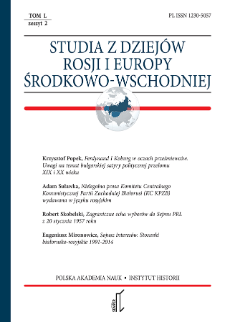- Search in all Repository
- Literature and maps
- Archeology
- Mills database
- Natural sciences
Advanced search
Advanced search
Advanced search
Advanced search
Advanced search

Object
Title: Monarchiści i ich symulacje polityczne w maju‑lipcu 1920 roku : memoriały płk. Maxa Bauera i gen. Wasilija Biskupskiego
Subtitle:
Studia z Dziejów Rosji i Europy Środkowo-Wschodniej T. 50 z. 2 (2015)
Contributor:
Institute of History of the Polish Academy of Sciences ; Polish Historical Society
Publisher:
Place of publishing:
Description:
Summary in English and Russian. ; p. 31-54
Type of object:
Abstract:
This study focuses on two monarchist projects: one German (memorial by Colonel of General Staff Max Bauer announced at the Monarchist Congress in Budapest on 20 June 1920) and one Russian (memorial by General Vasiliy Biskupskiy, announced at the Monarchist Congress in Budapest on 8 July 1920). The author of the study defines the complex context of the functioning of the „monarchist international” after the end of World War I. She hypothesises that, aside from plans on how to counter the Bolshevik threat, the main outcome of the activity of German and Russian monarchists at that time was to be the destruction of Józef Piłsudski’s rival „Eastern programme”. However, the problems that could have arisen in consequence of the Polish Eastern policy never saw the light of day by reason of the decision subordinating the Civilian Administration of the Eastern Territories to the authorities in Warsaw, which resulted in a loss of interest in the monarchist movement in Germany, as it was seen as a temporary too lof political struggle.
References:
Axhausen G. (Hrsg.), Organisation Escherich. Die Bewegung zur nationalen Einheitsfront. Weicher, Leipzig und Berlin 1921.
Fox J. P., Max Bauer: Chiang Kai‑Shek’s First German Military Adviser, „Journal of Contemporary History” Vol. 5 (No 4) (October 1970), p. 21‑44.
Gierowska‑Kałłaur J., „Depozyty” Walerego Sławka przechowywane w Moskwie. („Biuro Detaszowane Oddziału II Naczelnego Dowodztwa 1919”), „Studia z Dziejow Rosji i Europy Środkowo‑Wschodniej” 47, 2012, s. 208‑272.
Gierowska‑Kałłaur J., Question of the access of restored Polish State to the Baltic See in opposition to German interests. Marea Loc al Memoriei si al Desfasurarilor Geostrategice. Asociatia pentru Dialog Intercultural si Studii Istorice, red. Florin Anghel, Gabriel Stalian Manea, Metin Omer, Editura CETATEA se SCAUN, Targoviste 2014, p. 225‑238.
Gierowska‑Kałłaur J., Zarząd Cywilny Ziem Wschodnich (9 lutego 1919‑9 września 1920), Wydawnictwo Neriton & Instytut Historii PAN, Warszawa 2003.
Groller H. D., Karl Seitz – Ein Leben an Bruchlinien, Schmid, Wien (2005).
Łossowski P., Konflikt polsko‑litewski 1918‑1920, Warszawa 1996.
Mędrzecki W., Niemiecka interwencja militarna na Ukrainie w 1918 r., DiG, Warszawa 2000.
Nasko S., Karl Renner W. Die Ősterreichischen Bundeskanzler. Leben und Werk, Hrsgb. V. F. Weissensteiner und E. Weinzierl, Ősterreichischer Bundesverlag, Wien 1983, s. 24‑53.
Orlik Z. [oprac.], Gmach Generalnej Dyrekcji Dobr Książęcych w Pszczynie – http://www.biurogk.com/gmach_palais_historia.html.
Rosen S. E., Orgesch. Scherl, Berlin 1921.
Schwertfeger B., Bauer Max, [w:] Neue Deutsche Biographie (NDB). Band 1, Duncker &Humblot, Berlin 1953.
Vogt A., Oberst Max Bauer. Generalstabsoffizier im Zwielicht. 1869‑1929, Biblio Verlag, Osnabruck 1974 (Studien zur Militargeschichte, Militarwissenschaft und Konfliktforschung 6).
Wołkow S. W., Generały i sztab‑oficery russkoj armii. Opyt martirologa, Tom 1, Moskwa 2012.
Relation:
Studia z Dziejów Rosji i Europy Środkowo-Wschodniej
Volume:
Issue:
Start page:
End page:
Detailed Resource Type:
Format:
Resource Identifier:
oai:rcin.org.pl:57820 ; p-ISSN 1230-5057 ; e-ISSN 2353-6403 ; 10.12775/SDR.2015.2.02
Source:
IH PAN, sygn. A.453/50/2 Podr. ; IH PAN, sygn. A.454/50/2 ; click here to follow the link
Language:
Language of abstract:
Rights:
Terms of use:
Copyright-protected material. May be used within the limits of statutory user freedoms
Digitizing institution:
Institute of History of the Polish Academy of Sciences
Original in:
Library of the Institute of History PAS
Projects co-financed by:
Access:
Object collections:
- Digital Repository of Scientific Institutes > Partners' collections > Institute of History PAS > Serials
- Digital Repository of Scientific Institutes > Partners' collections > Institute of History PAS > Institute Publications
- Digital Repository of Scientific Institutes > Partners' collections > Institute of History PAS > Institute Publications > Journals
- Digital Repository of Scientific Institutes > Partners' collections > Institute of History PAS > Institute Publications > Journals > Studia z Dziejów Rosji i Europy Środkowo-Wschodniej
- Digital Repository of Scientific Institutes > Literature > Journals/Articles
Last modified:
Sep 22, 2023
In our library since:
Jan 28, 2016
Number of object content downloads / hits:
1065
All available object's versions:
https://rcin.org.pl./publication/78087
Show description in RDF format:
Show description in RDFa format:
Show description in OAI-PMH format:
Objects Similar
Gierowska-Kałłaur, Joanna
Gierowska-Kałłaur, Joanna
Gierowska-Kałłaur, Joanna
Gierowska-Kałłaur, Joanna
Gierowska-Kałłaur, Joanna
Gierowska-Kałłaur, Joanna

 INSTYTUT ARCHEOLOGII I ETNOLOGII POLSKIEJ AKADEMII NAUK
INSTYTUT ARCHEOLOGII I ETNOLOGII POLSKIEJ AKADEMII NAUK
 INSTYTUT BADAŃ LITERACKICH POLSKIEJ AKADEMII NAUK
INSTYTUT BADAŃ LITERACKICH POLSKIEJ AKADEMII NAUK
 INSTYTUT BADAWCZY LEŚNICTWA
INSTYTUT BADAWCZY LEŚNICTWA
 INSTYTUT BIOLOGII DOŚWIADCZALNEJ IM. MARCELEGO NENCKIEGO POLSKIEJ AKADEMII NAUK
INSTYTUT BIOLOGII DOŚWIADCZALNEJ IM. MARCELEGO NENCKIEGO POLSKIEJ AKADEMII NAUK
 INSTYTUT BIOLOGII SSAKÓW POLSKIEJ AKADEMII NAUK
INSTYTUT BIOLOGII SSAKÓW POLSKIEJ AKADEMII NAUK
 INSTYTUT CHEMII FIZYCZNEJ PAN
INSTYTUT CHEMII FIZYCZNEJ PAN
 INSTYTUT CHEMII ORGANICZNEJ PAN
INSTYTUT CHEMII ORGANICZNEJ PAN
 INSTYTUT FILOZOFII I SOCJOLOGII PAN
INSTYTUT FILOZOFII I SOCJOLOGII PAN
 INSTYTUT GEOGRAFII I PRZESTRZENNEGO ZAGOSPODAROWANIA PAN
INSTYTUT GEOGRAFII I PRZESTRZENNEGO ZAGOSPODAROWANIA PAN
 INSTYTUT HISTORII im. TADEUSZA MANTEUFFLA POLSKIEJ AKADEMII NAUK
INSTYTUT HISTORII im. TADEUSZA MANTEUFFLA POLSKIEJ AKADEMII NAUK
 INSTYTUT JĘZYKA POLSKIEGO POLSKIEJ AKADEMII NAUK
INSTYTUT JĘZYKA POLSKIEGO POLSKIEJ AKADEMII NAUK
 INSTYTUT MATEMATYCZNY PAN
INSTYTUT MATEMATYCZNY PAN
 INSTYTUT MEDYCYNY DOŚWIADCZALNEJ I KLINICZNEJ IM.MIROSŁAWA MOSSAKOWSKIEGO POLSKIEJ AKADEMII NAUK
INSTYTUT MEDYCYNY DOŚWIADCZALNEJ I KLINICZNEJ IM.MIROSŁAWA MOSSAKOWSKIEGO POLSKIEJ AKADEMII NAUK
 INSTYTUT PODSTAWOWYCH PROBLEMÓW TECHNIKI PAN
INSTYTUT PODSTAWOWYCH PROBLEMÓW TECHNIKI PAN
 INSTYTUT SLAWISTYKI PAN
INSTYTUT SLAWISTYKI PAN
 SIEĆ BADAWCZA ŁUKASIEWICZ - INSTYTUT TECHNOLOGII MATERIAŁÓW ELEKTRONICZNYCH
SIEĆ BADAWCZA ŁUKASIEWICZ - INSTYTUT TECHNOLOGII MATERIAŁÓW ELEKTRONICZNYCH
 MUZEUM I INSTYTUT ZOOLOGII POLSKIEJ AKADEMII NAUK
MUZEUM I INSTYTUT ZOOLOGII POLSKIEJ AKADEMII NAUK
 INSTYTUT BADAŃ SYSTEMOWYCH PAN
INSTYTUT BADAŃ SYSTEMOWYCH PAN
 INSTYTUT BOTANIKI IM. WŁADYSŁAWA SZAFERA POLSKIEJ AKADEMII NAUK
INSTYTUT BOTANIKI IM. WŁADYSŁAWA SZAFERA POLSKIEJ AKADEMII NAUK




































